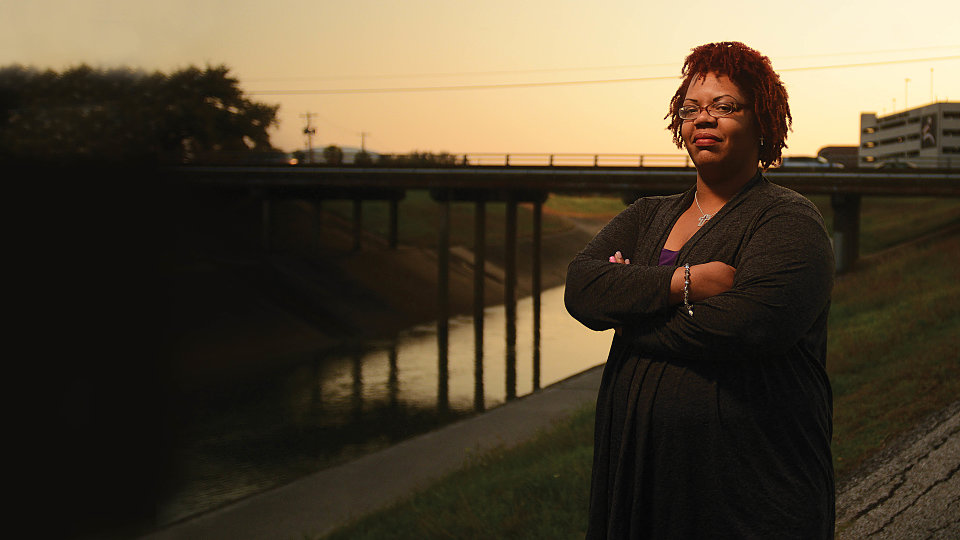Hope's blossom
Five years ago at the edge of a bayou, Vanessa Brown of Houston had reached the edge of her life when addiction, depression, her car and a tree all intersected.
Brown, now 30, recalled the night she tried to take her life by drowning herself. High on the drugs that had plagued her life since she was 12, Brown sped down a road in her car “just to escape the mundane – the hurt, the pain of life. I closed my eyes, put my foot on the pedal and I drove toward the bayou.”
She chuckles at what happened next – and saved her life. “I didn’t know there was a tree smack dead in front of the bayou.”
Reflecting on the wreck, she now sees it as an “edge kind of experience, where you’re just over the edge, kind of fighting to get where you want to go, and God is saying, ‘No, you cannot go.’
"So when I think about the bayou experience – what happened and what really went on – it was really, really close. Looking back over it, it was really crazy. But sometimes you feel like there’s no other hope, no other way.”
The near-tragedy, however, was also a turning point; the edge of an old life and the beginning of hope.
Brown’s childhood years were fraught with many of the traps common to growing up urban and in poverty.
“I grew up in not-as-good of a situation,” she explained. “I fought to get out and moved out on my own. Then I had so many high and low points in my life where I was able to work it out and go to school, but then I ended up falling back down, not able to go to school.
“It was drug addiction. I would rise up and kind of overcome drug addiction, and then, once again, something would happen – I guess they call them triggers in life – where it would be a trigger, and I would fall back down to drug addiction.”
Later, she broke her addiction to cocaine in a parking-lot experience with God, and she began the search for a future for herself and her two sons, Averen and Jamarius.
The road to hope wasn’t instant or easy. She still battled feelings of depression and low self-worth, leading her to that fateful night at the bayou.
After the wreck, she was placed in a psychiatric ward for monitoring, and she lost custody of her sons for a period. In the next few years, she struggled with finances and became homeless, living with different relatives and friends. Then a shelter. Then hotels.
It was a low point in her life verbalized by her son Averen when he looked up at her during a meal and told her she needed to change.
“I think that [turning] place is when my son said, ‘You can’t keep doing this, because you have to take care of us. If you don’t take care of you, you can’t take care of us. So what you’re doing is directly affecting my life.’
“It was simple words from a 7 year old at the time – when he told me, ‘Mother, who’s going to take care of us if you don’t take care of yourself? You continue to feed us [but] you’re not feeding yourself.’”
His words spurred change.
When Brown finally could afford her own apartment, the boys had their own room, but it was in Houston’s Fifth Ward, as she described it, “in the projects.” She also enrolled in Houston’s College of Biblical Studies, working toward earning a bachelor’s degree in business administration and to better her family’s financial situation.
Then God brought her hope in a providential meeting at a local gym.
“I came into contact with Buckner Family Place during an encounter with a young lady I met at the YMCA,” Brown said.
The young lady was Wendi Hay, a mother of four and an alumna of Buckner Family Place in Houston, a program designed to help single parents earn an education and gain valuable life skills while providing them and their children a safe living environment. Like Brown, Hay struggled with addiction prior to the program.
“We were communicating and had similar story situations. She told me about [Family Place], and I was like, ‘Wow, really?’ Out of all my fight and struggle, I had no idea they had places that helped you reach your goals and succeed in life.”
Hay gave Brown the contact information for Cari Latimer, Family Place’s program director. When Latimer told Brown she would be placed on the waiting list for the program, Brown’s response showed desperation.
“I told her, ‘OK. I just need a little hope and you can just be my ray of hope,’” Brown said, “And so she was. She called me later to talk to me and interview me. I was impressed with her, and I think she was impressed with me.”
The interview resulted in a placement in the program. “I was so excited. I was ready to go. I had the kids, and we were packed – well, kind of halfway packed already, ready to go somewhere. It was time to go.”
From the time she moved in, Latimer provided Brown support she’d never had in life. “What I didn’t have, she provided for me. She talked me through so many things. She’d sit me down and went over a lot with me and told me that, ‘I’m a friend, and I’m here.’”
The support also led to a renewed emphasis on education.
“Education is very important to me,” Brown said. “My mother and father didn’t graduate high school, so everyone attempted to go to school in the family; most of them dropped out. Actually, my youngest sister has her degree. I started and stopped, started and stopped, so I haven’t really completed things in life. It’s been a cycle of failure in my family, and it has to be broken. Being able to go to school and not worry about rent and bills, I can just focus on breaking this cycle. Words can’t even describe how that feels.”
“It’s huge really, especially when you look at families in poverty,” Latimer added. “A key to changing that generational poverty is often education. It’s not always, of course, but often. Higher education helps lead the next generation out of poverty. Vanessa recognizes that.”
Brown is just months away from earning her bachelor’s degree and already is talking to Latimer about extending the program to include a master’s degree.
Latimer and Buckner Family Place, she said, “has been a blessing to me. I was still fighting so hard to grow, to get to higher places in life, to have stability for my kids and to provide for them what they needed to grow. Because when you have kids, it’s no longer about you; it’s about them.”
Latimer agreed Brown’s progress has been a testament to growth. “It’s hard to describe in six months the progress she’s made. Knowing her story and how she grew up, the things that she’s experienced – everything from poverty and abuse to drug addiction and homelessness – obviously she’s come a long way from those things. She’s stable. She’s not using drugs; she’s clean. She is determined to live a life outside of poverty.
“I think she is just learning more about who Vanessa is and embracing who God has created her to be and the vision that he has for her life. She’s really seeking him to understand what the next steps are.”
“With Buckner, I was a seed in the ground, growing through the dirt, fighting through the mud and the dirt,” Brown explained. “And when I met Cari, I was able to sprout and kind of come out of the dirt and grow up to the point where I can blossom. That’s really how I feel about Buckner. It’s the place that allows you to grow out of the dirt. And that’s an awesome place to be, when all of your life you’ve been in the dirt.”
She also found a renewed hope through the help from Family Place. “It’s hope in Christ. Until you really have a relationship and really know him, then you really don’t know the hope the way you should.
“Everybody has a whole book written about them in heaven somewhere, telling what they’re going to do – and the end of the story is bigger than a bayou, the end of the story is bigger than death,” she said. “It’s life. And so when I think about hope for the future, I think about life.”
Story by Russ Dilday
Photography by Mike McLean






Add a Comment